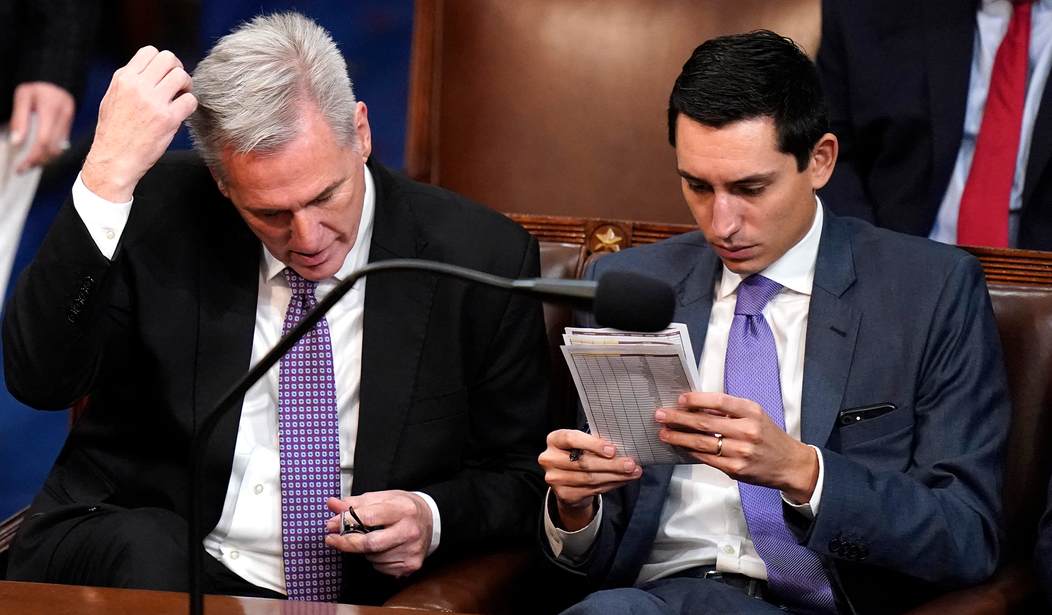Will Kevin McCarthy get elected to Speaker of the House on the 12th ballot this afternoon after finally putting a deal down on paper? News broke last night that the GOP leader had a breakthrough of sorts late in the day, helped along by dissident Republican Chip Roy of Texas. The new deal gets more specific about committee assignments and votes on particular issues of note for the Freedom Caucus.
Even Semafor noted, though, that this is not likely to be enough to get McCarthy to 218:
Republican holdouts crisscrossed in and out of negotiation sessions led by McCarthy lieutenants throughout the day, growing more tight-lipped about details as the day wore on.
By the evening, “no” vote Rep. Ralph Norman, R-S.C. said he was reviewing a n offer from leadership in writing that would give members 72 hours to review legislation and address his calls for a vote on term limits, among other provisions.
“It’s changes that we wanted,” Norman said after leaving Rep. Tom Emmer’s, R-Minn. office, where talks were taking place. “Now, we’ve got a lot more that we have to get to. This is round one and it’s on paper, which is a good thing.”
The problem for McCarthy is that he can only lose four votes, and there seems to be at least that many among the 20 dissidents who flat-out refuse to ever vote for him. Matt Gaetz declared yesterday that he’d only vote for McCarthy if a rules package “straitjacketed” him, but Bob Good, Lauren Boebert, and Eli Crane all issued statements that they wouldn’t vote for McCarthy under any circumstances.
If not, that may be their loss, because the deal emerging looks pretty good for back-benchers. It’s looking so good, in fact, that it has the Washington Post lamenting the loss of the traditions of dictatorial speakerhood, especially in relation to the iron grip the office has had on the Rules Committee:
These archconservatives have won promises to secure posts on the powerful Rules Committee; to gain influential posts on other committees; to have wide-open debate with unlimited amendments on government funding bills; and to give just a single member the power to compel a vote to expel McCarthy as speaker if they decide he hasn’t lived up to his word.
The Rules Committee is often called the Speaker’s Committee because its appointees all come from the speaker and it is stacked — nine members of the majority to four from the minority traditionally — so that the panel can set the lineup for debating legislation however the speaker decides. …
The hard-liners have a point about how the government funding bills are supposed to be debated under “open rules,” in which a marathon session of amendment votes can be held. This process effectively ended more than six years ago as Democrats, then in the minority, flustered Republicans by repeatedly offering amendments regarding Confederate symbols at federal institutions.
Unable to defeat those amendments, Republicans just shut down the open-rule process and Pelosi, taking power four years ago, happily continued to rule with that iron fist when it came to amendments.
Longtime observers expect a similar deadlock to happen if McCarthy, or whoever claims the gavel, tries to open up the amendment process. And it will basically shut down the process for funding federal agencies, raising the risk of government shutdowns or forcing them to continue operating on the previous year’s budget.
“The deal is, whoever the speaker is has to be able to govern, has to be able to move a legislative agenda forward,” McGovern said. “What these guys are trying to do is they’re trying to make it impossible for the speaker to do anything without their approval.”
Color me a bit confused. Media outlets like the Post often also lament the harsh partisanship in the House over the last couple of decades, along with the lack of regular order. Perhaps those ills and the aggregation of absolute power under the Speaker are more than just correlated? At the very least, the hardliners have a point about the democratic process within this democratic institution, too. If a Speaker can’t dictate floor access and amendment consideration via a Rules Committee fiat, then that makes the other 434 members of the House a bit more able to represent their own constituents rather than just the 700,000 or so in a California district.
It seems odd that the paper that ostentatiously lectures its readers with its “Democracy Dies in Darkness” banner would argue for maintaining the Speaker role in its current dictatorial state. Or do they not grasp what “democracy” really means?
Ironically, those changes have the potential for unlocking more moderation than so-called extremism, which mainstream media outlets claim to want. That would at least theoretically free up members to pursue alliances on amendments outside of the narrow party platforms and identities that have produced gridlock until now. At the very least, it’s worth a try, because what we have seen for the last generation or longer under the dictatorial-Speaker model clearly isn’t working.
One might think that such an agreement might even appeal to a few Democrats on the next ballot. I’m not the only person to consider that, either:
"I assure you that if Democrats join up to elect a moderate Republican [as Speaker], I will resign from the House of Representatives." – @mattgaetz on Fox News
— Julia Jester (@JulesJester) January 6, 2023
The most likely outcome from this is another defeat for McCarthy, but what he wants to see is some movement from the 20 dissidents in the next ballot. At some point, though, McCarthy may need to kick off the grand era of bipartisan engagement with a deal to lower the majority threshold by having Democrats depart the chamber. Either that, or McCarthy will need to give it up and let someone else try to reach 218.







Join the conversation as a VIP Member